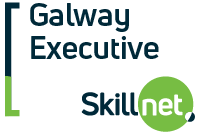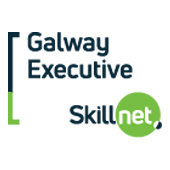
No events to show
Description
Frontline Managers Programme -This programme is co-funded by the Government of Ireland and the European Union. Learn more https://www.eufunds.ie
Please email: info@galwayexecutiveskillnet.com to register for that training or to get more information.
Training Date: Introduction Session: January 25th, 11am - 12pm
Overview
During this programme, participants will explore the areas of:
- Understanding management: roles and responsibilities in addition to required behaviours
- Leading teams: being a leader, understanding the stages of team development, identifying dysfunctional behaviours and how to address them
- Understanding and managing self: successful managers have high levels of self-awareness so they can adjust their behaviours as required and manage stressful situations confidently
- Time management and delegation: prioritising workloads, eliminating the urgency addiction, delegating effectively
- Communication: managing daily communication, providing constructive feedback, having a difficult conversation
- Managing change: understand responses to change, determining approaches to engaging employees in a change initiative
Course Content
Workshop 1 Understanding Management
Great managers understand that there isa direct link between people who take an active interest in what is happening in the business and the achievement of business results. The challenge, therefore, is for great managers to ensure people remain engaged and focused. They need to establish ways of motivating people to take an active interest in what they can do to perform and deliver at the highest level. When managers do this effectively, they become great leaders. It is critical that the great manager knows how to select the right person for the defined role, set clear expectations, motivate and develop the person in line with the direction of the business.
Learning objectives:
• Determine effective approaches you can use to select and recruit the right people for your organisation.
• Align expectations for individual roles with the defined business objectives.
• Identify motivating factors and determine ways of applying them to your organisation.
• Set a clear and practical action plan for developing your skills as a great manager
Workshop 2 Managing Teams
Teams are more than a group of individuals working together on a body of work. Effective teams are greater than the sum of all members. Managers need to understand the behaviours that make an effective team and determine practical approaches to implement those behaviours. A manager needs to also recognise the stage at which their team is forming and determine approaches to ensure they are performing.
Learning objectives:
• Understand the nature and value of teamwork.
• Identify the factors that contribute to dysfunctional teams
• Develop strategies for addressing core dysfunctions of teams.
• Determine behaviours you need to start, continue and stop doing to build a high performing team.
Workshop 3 Understanding Yourself and Others
People respond to the behaviours of their managers. It is therefore imperative that managers understand their behaviours and identify ways to manage them successfully. This workshop will focus on personal understanding: what motivates you and what are your blind spots? What coping mechanisms have you developed that are serving you well and which ones need to be replaced with more effective methods that enable you to manage your team effectively? What will help you understand how to develop a strong working relationship with your own manager.
Learning objectives:
• Understand your personality type: your strengths and your blind spots.
• Determine approaches to managing your blind spots.
• Recognise what motivates your team members.
• Develop strategies for rebuilding strong relationships with your team members and your manager.
Workshop 4 Communicating for Performance and Managing Conflict
How a manager communicates with his/her team will either motivate or demotivate team members. Knowing how to listen and interpret the information provided is the first step in effectively communicating with your team members. Done effectively a manager will then have an accurate starting point for getting his/her message across. Too often the focus is on simply imparting information. This workshop will look at communication so that managers can provide constructive feedback and ensure corrective action is taken. It will also explore how to handle conflict and how to work to a long-term solution to prevent it a rising again.
Learning objectives:
• Understand the elements of effective communication.
• Develop effective active listening skills.
• Determine approaches for providing effective feedback.
• Manage difficult conversations with greater ease and ability.
• Resolve issues swiftly preventing a build-up of frustration and negativity.
Certification
This programme is accredited by QQI Ireland (formerly FETAC) Component Certificate Level 6 “Managing People."


